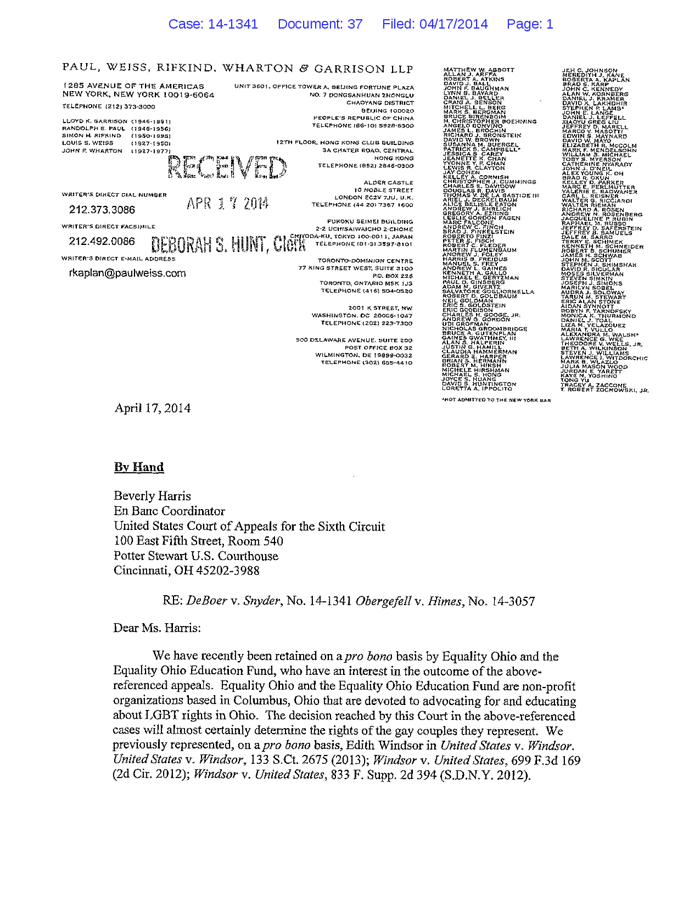
WASHINGTON — The lawyer who successfully fought Edith Windsor's case against the Defense of Marriage Act on Thursday alerted a federal appeals court to her disagreement with a legal move by lawyers for same-sex couples in Michigan and Ohio and her plan to seek to intervene in the appeal.
In a letter to the clerk of the 6th Circuit Court of Appeals, Roberta Kaplan announced that her firm, Paul Weiss, is representing Equality Ohio and the Equality Ohio Education Fund and will seek to intervene in the ongoing marriage and marriage recognition appeals cases pending before the court.
The move by Kaplan — an Ohio native who lives in New York — marks the second time that she has sought to intervene in one of the marriage cases that has followed the Supreme Court's decision striking down DOMA in Windsor's case.
The 10th Circuit denied her request made earlier this year in the case challenging Utah's amendment banning same-sex couples from marrying.
In this attempt, lawyers for the state of Michigan asked the 6th Circuit earlier this month to hear the case en banc — or, by the whole court — rather than by a three-judge panel of the court, which is the normal path an appeal would take.
The lawyers for Michigan same-sex couples who succeeded at the trial court level opposed the request in a filing on April 11, writing that a "hearing before a 3-judge panel rather than hearing en banc will be most likely to expedite this Court's consideration of the case." The lawyers called the state's other arguments for en banc consideration "seriously flawed."
Earlier this week, lawyers representing the Ohio plaintiffs in the marriage recognition case there filed their own brief, also opposing Michigan's request for immediate en banc consideration.
In the letter filed by Kaplan on Thursday, however, she writes, "[O]ur clients, in contrast to the gay couple appellees in [the Michigan case], would support the granting of en banc review, but for very different reasons than those proffered by the State of Michigan."
Specifically, she writes that an en banc panel would be required to reconsider the prior decisions of the circuit about what level of scrutiny should apply to "laws that discriminate against gay people."
Previously, the circuit has applied rational basis, the lowest level of scrutiny, when considering whether laws that classify people based on sexual orientation are constitutional. Kaplan argues that "a heightened level of scrutiny should apply" — the same argument advanced by the Obama administration and many LGBT rights advocates — and that sending the case immediately to en banc consideration would allow the 6th Circuit to revisit the question of what level of scrutiny to apply to such laws.
The letter, which notes a plan for the groups to file a motion to intervene in the appeal "as soon as practicable," was sent to the court, according to Kaplan, because the motion for en banc review is currently pending before the 6th Circuit.
Asked why Equality Ohio took the unusual move, Executive Director Elyzabeth Holford told BuzzFeed that rather than disagreeing specifically with the other lawyers, the plan to seek intervention is "more about just being sure that everything possible is being considered and that we represent all the needs that we can of LGBT Ohioans. ... It's just another way of looking at it."
From a broader perspective, she added, "All marriage cases in the 6th Circuit are of critical importance to loving, committed LGBT couples and families in Ohio, and Equality Ohio is therefore advocating to ensure that LGBT [people] are represented at every judicial level possible as we're moving forward with marriage equality."

